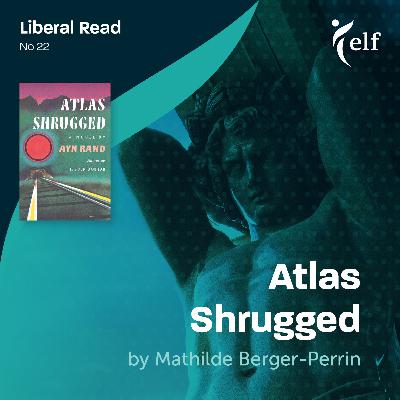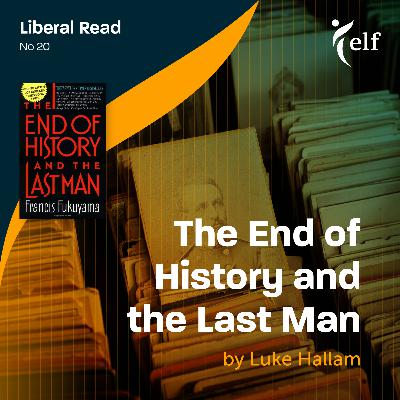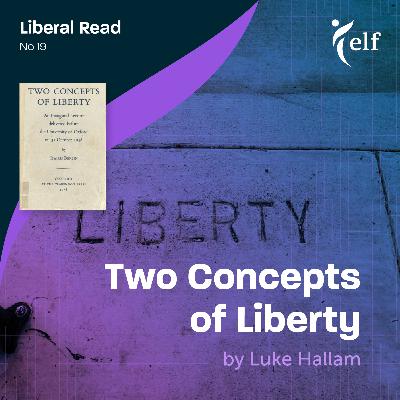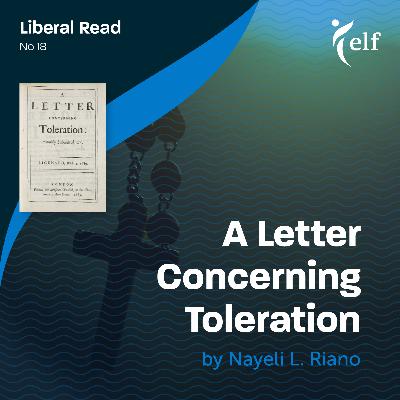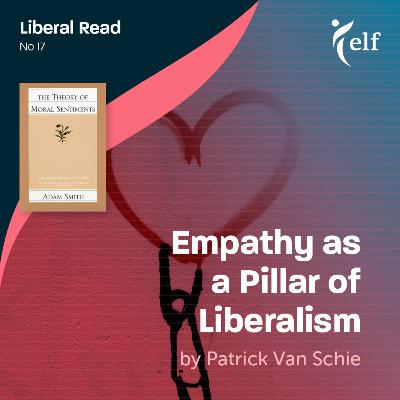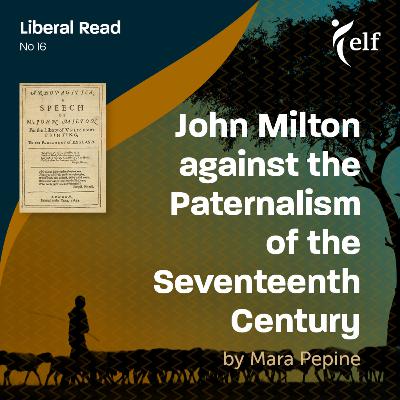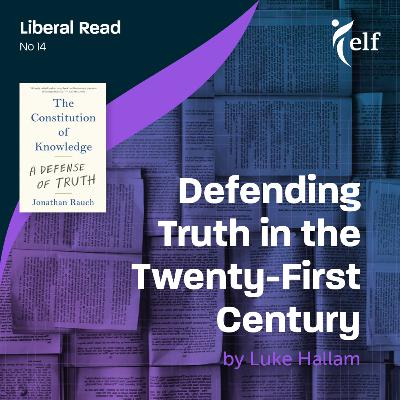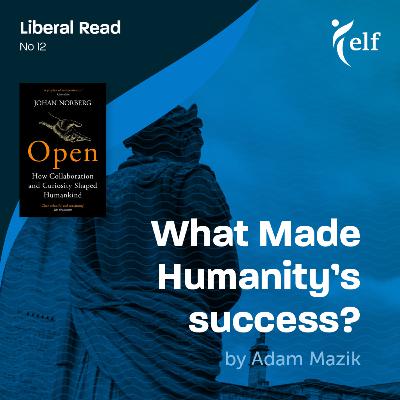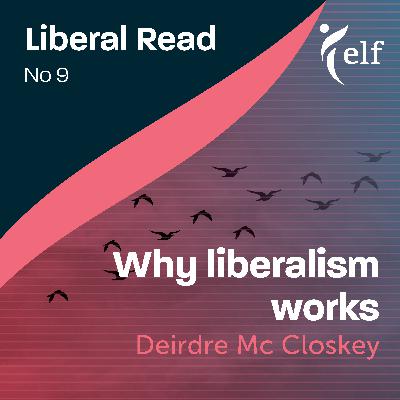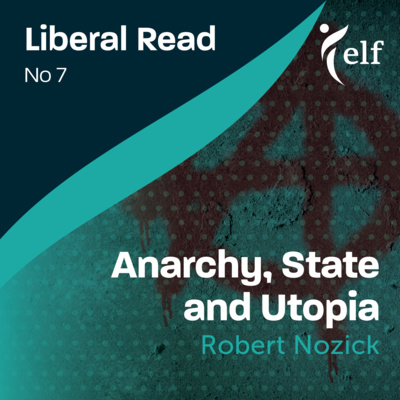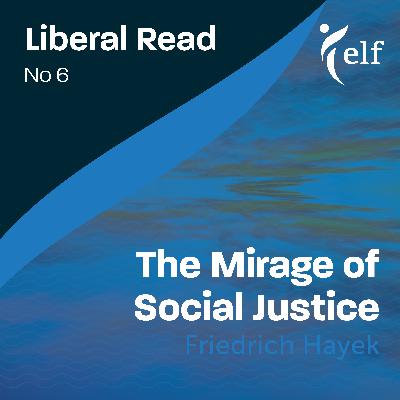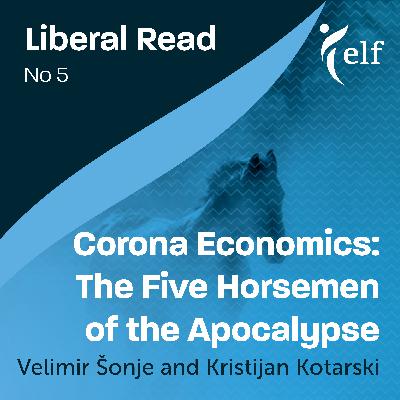Discover Liberal Reads
Liberal Reads

Liberal Reads
Author: European Liberal Forum
Subscribed: 5Played: 22Subscribe
Share
© European Liberal Forum
Description
A series of crises has put many liberal ideas under question. Inspired by a popular commercial concept, Liberal Reads are packaged in an easily accessible format that provides key insights in 30 minutes or less. The aim of Liberal Reads is to revisit and rethink classical works that have defined liberalism in the past, but also to introduce more recent books that drive the debate around Europe’s oldest political ideology. Liberal Reads may also engage critically with other important political, philosophical, and economic books through a liberal lens.
Curated by Antonios Nestoras, PhD.
Curated by Antonios Nestoras, PhD.
29 Episodes
Reverse
BOOK REVIEW - Francis Fukuyama "Liberalism and Its Discontents" (2022)
By Nataliia Bovkun
Liberalism and Its Discontents is the latest book by Francis Fukuyama, the most celebrated liberal thinker of our time. The author applies his rigorous analytical approach to the challenges faced by liberal democracies today and offers a nuanced and insightful analysis of the sources of discontent and potential solutions to these problems. He puts forward a convincing and laconic argument regarding the unchanged relevance of liberal democracy despite the criticism he has been facing in recent years.
Although liberalism has not experienced the same level of collapse of confidence that communism did in the late 20th century, it has nonetheless faced significant challenges. Fukuyama’s book examines a range of obstacles to liberalism, such as the growth of populism, nationalism, and authoritarianism, in addition to the implications of economic and technological developments for liberal societies. The book offers a critical assessment of the current state of liberal democracies and proposes strategies for addressing the discontents that threaten their stability and legitimacy.
BOOK REVIEW - Joshua Cherniss "Liberalism in Dark Times" (2021)
By Tirso Virgos
On the first page of Liberalism in Dark Times, the latest book of Joshua Cherniss, we find a quote from Isaiah Berlin. This is unsurprising because it is one of the most widely cited liberal thinkers of the 20th century. However, the second quote belongs to Indalecio Prieto, one of the most famous members of the PSOE (Spanish Socialist Workers’ Party) during the Second Republic and the Civil War. It is an appeal to the soldiers and militias of the Republican side of the war during the first weeks of combat: "Do not imitate them! Do not imitate them! Surpass them in moral conduct; surpass them by being generous. I do not ask you, however, that you should lose either strength in battle or zeal in the fight. I ask for brave, hard, and steely breasts for the combat... but with sensitive hearts, capable of shaking when faced with human sorrow and being able to harbour mercy and tender feelings, without which the most essential part of human greatness is lost."
It is, Cherniss argues, as he quotes Prieto at the end of the book again, a very liberal speech because this book is an attempt to define a “tempered liberalism” that is not focused on high principles and institutions, such as the one preached by, for instance, John Rawls. Instead, it places emphasis on a liberal disposition, a liberal ethos that aims to combat cruelty, ruthlessness, and all of the common vices of humankind. For this reason, Prieto, a socialist, can also be a tempered liberal, such as Albert Camus, Raymond Aron, or Max Weber. The book focuses on certain key thinkers and their ideological evolution and actions to provide a solid description of the nature of tempered liberalism.
BOOK REVIEW - Ayn Rand "Atlas Shrugged" (1957)
By Mathilde Berger-Perrin
What would happen, in a world where interventionism is rife, and where the masses feed off the creativity and production of a few, if all the entrepreneurs, scientists, businessmen, artists, and working elites went on strike? What if we stopped the motor of the world? What if Atlas, the Greek mythological figure carrying the world on his shoulders, got fed up and simply decided not to care anymore? Such is Ayn Rand’s proposal in Atlas Shrugged. Published in 1957, it has often been considered one of the most influential and controversial American novels of the 20th century. In the traditional scheme of strikes, workers collectivity stop their activity to show their worth to the elite.
Rand reverses this scheme with a what-if: what would a society deprived of capitalist values (e.g., free enterprise, private property, individual rights) look like? And how would those who see the fruit of their labor be taken away from them react? For Ayn Rand, who fled the USSR in the 1920s and embraced the American ideals of the Founding Fathers, such a society is simply not worth living in. Her entire life has been dedicated to defending freedom in all forms, proposing a resolutely individualist perspective on life. In 2009, a year after the financial crisis that was considered by some as the final nail in the American capitalist coffin, Atlas Shrugged sold as many copies as the Bible in the United States.
BOOK REVIEW - Helena Rosenblatt "The Lost History of Liberalism" (1958)
By Tirso Virgos
Liberal policies, liberal democracies, and even liberal dispositions are different ideas in different countries, but they share a series of common principles that define every strand of liberalism. At the thin core of liberal ideology, we always find the idea of protection of individual freedom from interference as well as a focus on the idea of the rights of each citizen. Regardless of the commitment to equality of opportunities, the value of autonomy, or limits of the state in matters of perfectionism or redistribution, all liberals share these principles.
However, in her great book The Lost History of Liberalism, Helena Rosenblatt argues that what she calls ‘the turn to rights’, which is mainly focused on avoiding interference in the private sphere, in liberal ideology has been a recent invention and has been based on the Anglo-Saxon liberal tradition. Meanwhile, historical liberalism, which emphasized civic virtue and morals and has its roots in Germany and France, has been nearly forgotten. Thus, the association of liberalism with the United Kingdom and, especially, the United States is false and obscures a very important part of the liberal tradition that could be used to reconceptualise the term and propose political alternatives in today’s world.
BOOK REVIEW - Francis Fukuyama ""The End of History and the Last Man" (1992)
By Luke Hallam
Francis Fukuyama’s book The End of History and the Last Man (1992) has a well-earned reputation for its discussion of the strengths of liberalism and the underlying claim that liberal democracy represents history’s final destination. At the same time, it is also one of the most insightful works about the weaknesses of liberalism, with the less popular idea of the “last man” who emerges at the end of history and kicks the historical process back into gear.
We must understand both strands of the argument to appreciate the book’s profound contribution to 21st-century political philosophy. Thirty years after its publication, it remains a gold-standard reference for those seeking to understand our present historical moment.
BOOK REVIEW - Isaiah Berlin "Two Concepts of Liberty" (1958)
By Luke Hallam
The twentieth-century thinker Isaiah Berlin was more interested in the history of philosophy than in philosophy per se. His most famous contribution in this vein is his 1958 essay “Two Concepts of Liberty.” On the surface, it is an attempt to distinguish between two types of freedom: one “negative” or "freedom from", and the other “positive” or "freedom to".
More specifically, however, Berlin is concerned with the vague boundaries that pertain between the two. He focuses his attention on the inherent ambiguities of the concept of freedom itself, suggesting that unless we are clear about what exactly the concept of “liberty” can and cannot do for us, we will end up misusing it, sometimes with devastating consequences.
BOOK REVIEW - John Locke "A Letter Concerning Toleration" (1689)
By Nayeli L. Riano
Toleration is a concept that we consider commonsensical today. Religious toleration, moreover, is a fundamental concept that many of us would consider essential for the human right to worship freely. However, this was not always the reality. What we recognise as a general custom of humanity has evolved from years of debate over what it means to be tolerant and toward whom. Also, we as a society still have a long way to go in this quest for tolerance, yet, though it may still be imperfect, toleration is a concept that has been broadened largely through thinkers in the liberal tradition.
Locke’s A Letter Concerning Toleration is a difficult work to critique because it is the product of his theological and political thoughts. Locke’s ideas on toleration were influential in developing liberal thought and importing fundamental liberal principles into the intellectual debate. On the one hand, the concept of tolerance described raised controversial questions and challenged liberal reasoning. On the other hand, it has restored tolerance as the basic principle for a liberal society.
BOOK REVIEW - Adam Smith "The Theory of Moral Sentiments"
By Patrick Van Schie
The Theory of Moral Sentiments is not Adam Smith’s best-known work among the general public – that, of course, would be his economic analysis, The Wealth of Nations, whose (abbreviated) title many know, even if they are unfamiliar with its contents – but it is certainly a standard liberal work. Although Smith owes his enduring fame to The Wealth of Nations – it is thanks to this book that he is considered the founder of (classical liberal) economics – he considered The Theory of Moral Sentiments to be his best work. The irony goes even further: Smith is remembered as an important economist, which he certainly was, but his bread and butter was moral philosophy.
The Theory of Moral Sentiments and The Wealth of Nations are the first two instalments of a trilogy that Smith had intended to publish. In the first part – The Theory of Moral Sentiments – he laid down the foundation of his vision of humanity and society. In the second – The Wealth of Nations – he elaborated on the virtue of prudence, which for him meant the relations between people in the private sphere of the economy. It was his plan to further elaborate on the virtue of justice in the third book.
BOOK REVIEW - John Milton "Areopagitica: A Speech of Mr. John Milton for the Liberty of Unlicenc’d Printing, to the Parlament of England"
By Mara Pepine
The early half of the seventeenth century in England was marked by Charles I’s rule, the English Civil War, and following it the Cromwellian regime. The English Civil War had its roots in a religious war between Catholics and Protestants, a conflict that defines much of English history. Once the Protestants came into power, they abolished the monarchy and replaced it with parliamentary rule. During its dismantling of the English monarchy, the Protestant Parliament also went about dismantling the Star Chamber. The Star Chamber was an English court founded in the late fifteenth century whose original goal was that of supplementing the activities of other courts by targeting powerful individuals who might be able to intimidate the rest of the system into not prosecuting them. However, it soon morphed into an organ of the state responsible for abuses of power, e.g. imposing excessive punishments, which prompted the passage of the Habeas Corpus Act. Its abolition in 1641 was a very important step towards eliminating the unjust rule of the monarchy. However, the passage of the Licensing Order of 1643 showed that the Parliament was more interested in a transfer of power rather than in eliminating the abusive structures themselves. The law ensured the pre-publication censorship of books in England. As a response to the Licensing Order, in November 1644, the English poet and intellectual John Milton, who was a big supporter of and a key actor in the Cromwellian regime, published Areopagitica: A Speech of Mr. John Milton for the Liberty of Unlicenc’ d Printing, to the Parlament of England. His speech, which addresses the Protestant-led Parliament directly, is an open criticism of the Licensing Order and the paternalistic approach of the legislative body.
BOOK REVIEW - Ivan Krastev and Stephen Holmes "The Light That Failed: A Reckoning"
By Mara Pepine
The title of this book, The Light That Failed: A Reckoning, is directly inspired by the novel The Light That Failed written by Rudyard Kipling in 1891, depicting a tragic unrequited love story. What Stephen Holmes and Ivan Krastev hope to achieve is to explain how liberalism became a victim instead of the victor it was purported to be after the Cold War.1A preliminary look will highlight certain events of the last thirty years as underlying causes of the decline of liberalism: 9/11, the second Iraq War, the 2008 financial crisis, the annexation of Crimea, the Syrian War, the 2015 migration crisis, the Brexit referendum, and the 2016 American elections, all evolving against the background of China’s economic miracle and growing influence. With the most border enforcement since the end of the Cold War, and with decreasing public faith in the systems of democracy, the question this book aims to answer is the famous quote from Ben Rhodes ‘What if we were wrong?’, referring to the possibility that liberals might have gravely misread the post-Cold War situation.
BOOK REVIEW - Jonathan Rauch "The Constitution of Knowledge: A Defense of Truth"
By Luke Hallam
This book by the journalist Jonathan Rauch seeks to make sense of the threats facing liberal societies today – threats including the destructive convulsions of Donald Trump and his Make American Great Again movement, a global army of social media trolls, and the emboldened attacks against liberal cornerstones such as expertise, free speech, and diversity of opinion. Rauch is no pessimist, but he is clear-eyed about the crises we face, and The Constitution of Knowledge provides an authoritative and crisp account of those challenges. Over the past five years, plenty of writers have sent up flares about our so-called post-truth age. Yet the term ‘post-truth’ is refreshingly absent from The Constitution of Knowledge. This is because Rauch’s book, which is subtitled ‘A Defense of Truth’, is not an epigraph to something we have supposedly ‘lost’. Rather, it is a call to arms. Ultimately, he argues, truth isn’t lost; we have simply forgotten what it looks like, and we have permitted its enemies to exploit our confusion. The result is authoritarian politics, the erosion of democratic norms, ‘cancel culture’, and the depressing sense that ‘truth’ itself might be an illusion. But none of these problems is insurmountable.
BOOK REVIEW - Albert Camus "The Rebel"
By Luke Hallam
With the onset of the COVID-19 pandemic in 2020, thousands of readers turned to the French philosopher Albert Camus’ most famous novel, The Plague. They were attracted by its portrayal of ordinary people heroically battling pestilence in a daily slog of sacrifice, perseverance, and hope – and with good reason. But as visionary as The Plague remains, it is The Rebel (1951), the final book-length essay Camus published during his lifetime, that of all his works speaks the most to our politics, especially to anyone concerned with the problem of freedom. Camus’ broad aim was to understand the great events of the twentieth century – a period of wars and genocides, torture and execution, fascism and communism. He wanted to define an alternative political morality, one that would place certain limitations on what one human being can justly do to another and would strive to prevent such atrocities from ever happening again.
BOOK REVIEW - Johan Norberg "Open: The Story of Human Progress: How Collaboration and Curiosity Shaped Humankind"
By Adam Mazik
Johan Norberg makes a strong statement: every single time when societies and people have experienced an increase of wealth, innovations, and living standards, the reason was a broadly understood ‘openness’, of course, relative to the specific time. By openness, the Swede means openness towards trade, immigration, and the exchange and expression of different ideas. Analysing evidence from the 300,000-year history of Homo sapiens, he comes to the conclusion that every time those factors came together, the result was a remarkable explosion of wealth.
The lesson is this: the Western world does not have a patent on economic growth, openness, and tolerance. As Norberg shows, periods of wealth and relative freedom have appeared in different times and different cultures. And for a very long time, Europe has not been a very good example of the values that we today would describe as liberal. The second lesson is more painful: All those past enrichments ended. Wars, conflicts and political decisions in the past were able to destroy the fundaments and results of those dynamic populations. Each period of ‘openness’ and progress gave way to a time of ‘closing down’ and regress, a return to traditional(-ist) values and isolation from the rest of the world.
BOOK REVIEW - Michael Huemer "The Problem of Political Authority: An Examination of the Right to Coerce and the Duty to Obey"
By Adam Mazik
What is political authority? Why is the state allowed to do certain things that no person or organisation can? Is there a logical explanation for this? And if not: what then? Huemer’s book is intellectually engaging, logical, compelling, and well-written. It is an excellent option for anyone starting their adventure into political philosophy. While the conclusions are radical and one surely doesn’t have to agree with everything Huemer says, it is a good antidote for the political biases that have been surrounding us all our lives. Whether the reader is a libertarian, a socialist, a conservative, or some form of moderate, Huemer’s argumentation will many times cause cognitive dissonance and force them to reflect on their political and moral beliefs.
BOOK REVIEW - Friedrich August von Hayek "Road to Serfdom"
By Adam Mazik
The Road To Serfdom is arguably Hayek’s most important book, and certainly the one that has had the most influence. The main thrust of the book is the demonstration that economic planning in its last consequence must lead to a totalitarian state. Using both abstract and historical examples, Hayek shows the impossibility of a democratic socialist system in which the freedoms and rights of the individual are respected, not without explaining the intellectual roots of the socialist and national-socialist movements. Additionally, the Austrian spends a significant amount of time disproving the notion, commonly believed even today, that fascism and socialism are two opposed ideologies; he argues that, on the contrary, both movements are the children of the same collectivist and illiberal sentiments and ideas. On the positive side, the book is a plea for democracy, the spontaneous forces governing liberal society, and the rule of law.
BOOK REVIEW - Deirdre McCloskey "Why Liberalism Works: How True Liberal Values Produce a Freer, More Equal, Prosperous World for All"
By Adam Mazik
Liberalism is in danger, and liberal values and democracy are facing many challenges in today’s world. McCloskey’s book is the antidote to the ideology of populism, which is trying to make illiberal solutions for today’s challenges, and against the “big state” that is so loudly proclaimed in today’s public spheres and fora of exchange. McCloskey paints a picture of our history and free markets very differently from what we are almost coerced into seeing on a daily basis. It is a picture of optimism and progress, a story not filled with greed and corruption but rather human dignity and ingenuity. Not a story of war, coercion, and hierarchy—but of international cooperation, sweet talk, and egalité.
BOOK REVIEW - Milton Friedman "Capitalism and Freedom"
By Adam Mazik
What is the proper role of the government? What economic system should we follow in order to prosper and progress in freedom and order? What are the key services a government needs to provide for society? What is the best way to create a fair and innovative system of education? What is the government’s role in monetary matters? And should we determine who is allowed to enter into a certain profession through the means of government? Shouldn’t at least medical doctors be licensed? Those and many other questions are answered in Milton Friedman’s Capitalism and Freedom from 1962. In this important book, the great American economist delivers a crisp and engaging series of essays on the fundamental roles of government. He offers a solid and constructive critique of the flaws of the modern democratic welfare state and demonstrates concrete solutions to the problems of the system.
BOOK REVIEW - Robert Nozick "Anarchy, State, and Utopia"
By Adam Mazik
What is the ideal state? Is it the "soziale Marktwirtschaft" of Ludwig Erhard? Is it perhaps the Scandinavian model? Maybe it is the "night watchman" state... Or is the ideal system having no state at all? Anarchy, State, and Utopia (1974) by Robert Nozick is an intellectually engaging work by a bright libertarian radical. To this day, Nozick’s magnum opus is one of the most important—and the most respected—works in the intellectual history of libertarianism and classical liberalism. Nozick’s book consists of three parts, hence the title Anarchy, State, and Utopia. The uniqueness of his argumentation lies in his method of reasoning. Following Adam Smith, he calls it “invisible-hand explanations”. His theory does not contain an imagined or hypothetical social contract and doesn’t assume the existence of a creator or any deliberate design. Instead, the author argues that a minimal state would emerge spontaneously through individual decisions taken by the people and organisations in the state of nature. This state would emerge from self-interested actions, those which do not aim specifically at the creation thereof and without violating anyone’s rights. No state is more extensive than can be justified.
BOOK REVIEW - Friedrich von Hayek "Law, Legislation and Liberty, Volume 2: The Mirage of Social Justice"
By Adam Mazik
To the modern person, the term social justice almost seems self-explanatory. From the moment one gets interested in politics, "social justice" seems to have always been part of the argumentation of politicians from both the left and the right. But what does "social justice" mean? And is it always used in the same way? What is the relationship between "justice" and "social justice"? Can "social justice" actually be achieved? These and other questions are answered in "The Mirage of Social Justice", the second part of one of Friedrich August von Hayek’s most important books, Law, Legislation and Liberty. Its three parts are perhaps the essence of Hayek’s socio-philosophical thought. In "The Mirage of Social Justice" Hayek tries to prove that not only is the term "social justice" empty and meaningless, but the ideas behind the term as well as the execution of policies aimed at reaching "social justice" are a grave danger to the "Great Society” and our liberal civilisation. According to Hayek, "social justice" and its proponents have the potential to destroy the very institutions and concepts that make a free society and civilisation possible.
BOOK REVIEW - Velimir Šonje and Kristijan Kotarski "Corona Economics: The Five Horsemen of the Apocalypse"
When the pandemic was first confirmed, self-preservation instincts kicked in. In a global communication environment defined by the real-time free flow of information, fear spreads faster than any virus ever could. Combined with the fact that scientific knowledge of the virus was limited, the fear of infection eclipsed every other argument in the public debate. Naturally, the call to protect ourselves and others from infection was prioritised. It may be argued that the combination of fear, lack of information, and shallow moralising did nothing to help our societies deliberate or develop adequate public health policies. On the contrary, downgrading dissenting voices prima facie suppressed public discussion and encouraged a continuous sense of panic in society. In this context, the authors—economist Velimir Šonje and political scientist Kristijan Kotarski—examine the external and internal factors placing pressure on the decision-making process and the very fundamental values that underlie liberal democracy in Europe.




